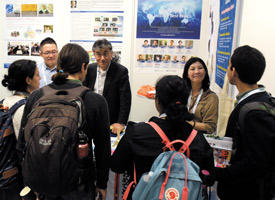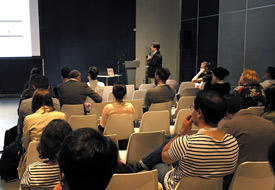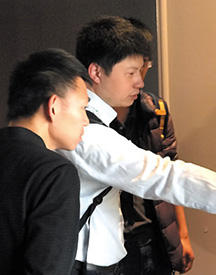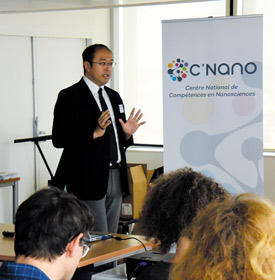

07/29/2019
Two major events in the materials science calendar are the Spring and Fall Meetings of the European Materials Research Society (E-MRS). With a view to enhancing awareness of the Advanced Institute for Materials Research (AIMR) beyond Japan, members from the institute participated in this year’s E-MRS Spring Meeting, which was held on 27–31 May 2019. It was organized in conjunction with the International Conference on Advanced Materials (ICAM) of the International Union of Materials Research Societies (IUMRS). As a result of AIMR’s long relationship with E-MRS and strong participation in previous meetings, AIMR director, Motoko Kotani, was one of the five conference chairpersons at this year’s spring meeting.

Like in 2014, 2016 and 2018, AIMR joined forces with representatives from the three other materials-related World Premier International Research Center Initiative (WPI) centers, namely the International Center for Materials Nanoarchitectonics (MANA), the Institute for Integrated Cell-Material Sciences (iCeMS) and the International Institute for Carbon-Neutral Energy Research (I2CNER), to promote the WPI in Europe and beyond during this major international conference. A few days after the E-MRS Spring Meeting, the representatives of the four centers jointly participated in NanoMat, a workshop designed to strengthen partnerships between nanomaterials researchers in France and Japan.

As in past years, the four WPI centers ran an exhibition booth at the 2019 E-MRS Spring Meeting to introduce the activities of WPI and the four centers. The booth, which ran for three days (28–30 May), displayed posters and brochures about the WPI project and the four WPI centers. In addition, visitors had the chance to win various prizes in a lottery. Outreach staff from the four WPI centers answered questions and described the centers’ unique research environments and significant achievements. The booth attracted researchers from a diverse range of fields and countries, including both senior scientists, many of whom had collaborated with Japanese researchers or had stayed in Japan, and young researchers, many of whom were interested in exploring opportunities for advancing their careers at institutions in Japan.

In the scientific sessions, AIMR researchers gave two oral and four poster presentations. Hiroshi Yabu talked about a new class of materials known as metafluids that respond to magnetic fields and that can be used to strongly enhance the sensing of molecules by an analytic technique known as Raman spectroscopy, and Akichika Kumatani discussed analyzing graphite and graphene using a scanning electrochemical cell microscope. In the poster session, Teng Ma introduced his poster on optimizing the lateral structure of materials known as perovskites to realize stable and highly efficient solar cells. His proposal for simultaneously improving the stability and performance of perovskite photovoltaics won the best poster award.
Immediately after the main E-MRS Spring Meeting, a joint France–Japan workshop on molecular technology for advanced sensors was held as a satellite event. After introductions by Anne Charrier of the Center for Interdisciplinary Nanoscience of Marseille and Yutaka Wakayama, deputy director of MANA, ten invited speakers presented their latest results on a wide range of sensor technologies, including sensors for detecting molecules, gas, light and biomaterials, sensors that use organic field-effect transistors, sensors based on polymers and organic compounds, and sensors that employ electrical, electrochemical and optical transduction. From AIMR, Kumatani talked about nanoscale electrochemical imaging of electrode materials using a scanning electrochemical cell microscope. He proposed a new approach for designing two-dimensional materials, such as graphene, that is based on mathematical output, and he confirmed their high electrochemical performance experimentally by microscopic imaging. His presentation generated a lot of interest, as evidenced by the ensuing discussions. The long relationship between France and Japan in materials science seems set to continue to promote the development of cutting-edge sensor technologies.
After the E-MRS Spring Meeting, the NanoMat 2019 Workshop was held on 3–5 June 2019 at the Jussieu campus of Sorbonne University in Paris. It has been held alternately in France and Japan. This year it combined the 13th Japan–France Workshop on Nanomaterials and the fourth WPI Workshop on Materials Science. This meeting was co-organized by the French CNRS National Competency Cluster in Nanoscience (C’Nano) and MANA, iCeMS, I2CNER and AIMR.

The workshop started with welcome speeches by Corinne Chaneac, director of C’Nano and the main organizer of this year’s workshop, and Stéphane Régnier, dean of the Faculty of Science and Engineering, Sorbonne University. After that, representatives of the four WPI centers, Tomonobu Nakayama from MANA, Hiroshige Matsumoto from I2CNER, Susumu Ikeda from AIMR and Mitsuru Hashida from iCeMS, introduced their respective centers. French and Japanese researchers then gave scientific oral presentations. In the evening, Ma, Ikeda and Hiroya Abe from AIMR presented posters, which all resulted in fruitful discussions with French scientists. On the second day of NanoMat 2019, Yabu talked about synthesizing nanocomposite materials and Kumatani spoke about nanoscale electrochemical imaging on lithium-ion battery electrodes. The meeting included in a facility tour, one highlight of which was a laboratory containing nearly all of the nuclear magnetic resonance (NMR) systems at the Jussieu campus of Sorbonne University.
During the workshop, it was announced that the next NanoMat workshop will be hosted by AIMR in Sendai. This opportunity promises to further strengthen the good relationship in materials science between France and Japan.
These two latest events in France have further raised awareness of AIMR in France and Europe. By participating in future scientific exchange events, including the next NanoMat workshop, AIMR intends to forge even stronger cooperative ties with researchers overseas.